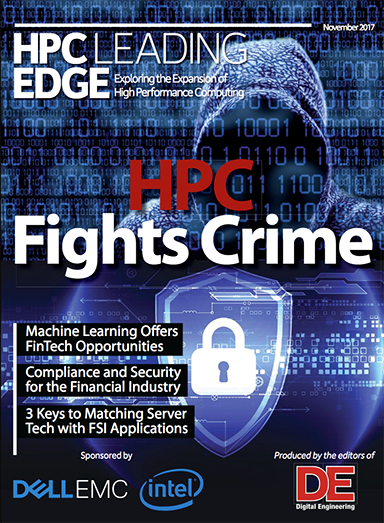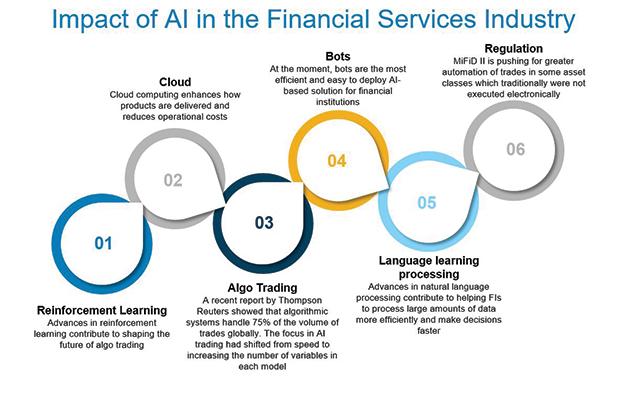Is There Enough Money for Time?

Key AI applications in financial services. Image courtesy of William Benattar.
Latest News
November 1, 2017
By Rachel Clark
Investing should be more like watching paint dry or watching grass grow. If you want excitement, take $800 and go to Las Vegas.”
Legendary economist Paul Samuelson provided this advice to suggest patience and slow decision-making. But in a world where information is infinite and machines do the trading, companies need to move fast. The $8 trillion global financial services industry (FSI) represents over 18% of the world’s investible market cap. And technology has been transforming this industry for over two decades, proving that speed equals money.
Despite its size, the industry faces challenges on multiple fronts. Economic challenges (increasing operating costs, shrinking margins), non-traditional competitors and increased operational risk due to political and cultural shifts confront them daily. Slow or outdated IT infrastructure can be crippling in this environment. To effectively rise to the challenge, modern FSI companies are using technology in a big way to buy more time in a given hour on a given day (i.e., do more using technology).
In a way, every financial organization is also a technology company. These companies are using IT to transform the way they do business. This ranges from interfacing with customers to managing and measuring risk to making investment decisions and controlling complex global operations. The speed at which FSI organizations are able to handle large financial and related data to derive business insights lends them a competitive edge. Thus, FSI companies are rapidly adopting artificial intelligence to enhance key business decisions.
Using traditional servers to run these new and emerging cognitive workloads results in suboptimal performance. FSI companies need to adopt a new breed of powerful servers designed to take advantage of the inherent structured nature of financial data and of the specialized needs of FSI. Co-processors or accelerators supplement or off-load critical work from the main server CPU, which significantly speeds computing time. These accelerators come in several flavors. This new breed of servers is helping enterprises in FSI gain an edge in performance and buy some valuable time. How should an FSI organization go about buying the servers that impact their business profoundly? Some examples highlight three key considerations that may serve as guideposts for choosing the right server.
Consideration #1: Throughput Performance
Investment banks that package and underwrite mortgage-backed securities have to be good at underwriting risk. Deep learning algorithms can significantly outperform traditional linear regression methods (lower prepayment and delinquency rates) to assess risk. Regular or even high-speed servers are suboptimal for handling vast historical financial data quickly. Instead, investment banks employ banks of servers with accelerators that provide the necessary speed and throughput. Academic studies have shown a speed up from weeks on traditional servers to days when using accelerator-based servers.
Consideration #2: Optimized Computational and Thermal Efficiency
Agencies calculate credit scores using AI-based analysis on terabytes and even petabytes of information, which leads to a more accurate picture of whether a borrower will be able to meet their obligations. This requires servers with advanced computational speeds and storage capacity. However, businesses do not want to sacrifice valuable physical space or put off too much heat during operations. Cooling costs are the primary cost consideration of a data center.
Consideration #3: Integrated, Robust Security
A consumer’s credit history includes sensitive information like salary, previous addresses, payment histories, Social Security number and a number of other data points. Recent headlines prove that data breaches can be devastating. Initial investigations reveal that the Equifax hack occurred due to not installing a security update. It is critical for servers to have built-in security that provides protection from the silicon to the software level and throughout the lifetime of the server. This requires the servers to be not only continuously vigilant for emerging threats but be able to recover to a pristine state in case of a breach.
Cognitive workloads are an important workload profile for FSI companies. To handle them efficiently, consider high throughput performance; optimized computational and thermal efficiency; and integrated, robust security when selecting a server portfolio. Dell EMC has long been on the forefront in helping customers tackle these business-critical workloads with the PowerEdge portfolio of servers. The PowerEdge portfolio has accelerated platforms that are optimized for key cognitive workloads and come with robust, built-in security.
Sometimes, buying time is a just matter of intelligent choice.
Rachel Clark is works in product marketing, Server Solutions, at Dell EMC.
Accelerator-Optimized High-Density Server Delivers Faster Results
The Dell EMC PowerEdge™ C4140 server is ideal for artificial intelligence, machine learning and deep learning. Working with large data sets and pattern matching algorithms requires additional computing resources to speed up performance, and the PowerEdge C4140 can deliver faster results.
Grow Your Business
PowerEdge C4140 features the latest from the Intel® Xeon® Processor Scalable Family. It has a chassis designed for maximum density and thermal efficiency for scale-out performance. With support for four accelerator cards, the PowerEdge C4140 handles many demanding technical and cognitive computing challenges. The C4140 delivers unthrottled performance with its unique interleaved accelerator design.

PowerEdge C4140 is an ideal, high-density solution for use cases requiring large, structured matrix calculations and high performance. For low latency, high performance applications such as machine learning, deep learning or financial services, the Dell EMC PowerEdge C4140 is the right fit.
Every PowerEdge server is designed on Cyber Resilient Architecture. This integrates security into the full server development lifecycle. The PowerEdge C4140 strengthens its protection capabilities by leveraging new security features that are built in. Dell EMC ensures trust and delivers a worry-free, secure infrastructure without compromise by considering each aspect of system security, from design to retirement:
- Rely on a secure component supply chain to ensure protection from factory to the data center.
- Maintain data safety with cryptographically signed firmware packages.
- Prevent unauthorized or malicious change with Server Lockdown.
- Wipe all data from non-volatile media—including hard drives, SSDs and system memory—quickly and securely with SystemErase.
Benefits
Faster time to insights with ultra-dense accelerator optimized server platform.
Optimizing performance for heterogeneous workloads running code on both CPU and accelerators.
Enhancing low latency performance for today’s most advanced HDR networks using two X16 low profile PCIe slots along with four accelerators.
Subscribe to our FREE magazine, FREE email newsletters or both!
Latest News







